Xiaolei Fang
Sensor-fusion based Prognostics Framework for Complex Engineering Systems Exhibiting Multiple Failure Modes
Nov 19, 2024Abstract:Complex engineering systems are often subject to multiple failure modes. Developing a remaining useful life (RUL) prediction model that does not consider the failure mode causing degradation is likely to result in inaccurate predictions. However, distinguishing between causes of failure without manually inspecting the system is nontrivial. This challenge is increased when the causes of historically observed failures are unknown. Sensors, which are useful for monitoring the state-of-health of systems, can also be used for distinguishing between multiple failure modes as the presence of multiple failure modes results in discriminatory behavior of the sensor signals. When systems are equipped with multiple sensors, some sensors may exhibit behavior correlated with degradation, while other sensors do not. Furthermore, which sensors exhibit this behavior may differ for each failure mode. In this paper, we present a simultaneous clustering and sensor selection approach for unlabeled training datasets of systems exhibiting multiple failure modes. The cluster assignments and the selected sensors are then utilized in real-time to first diagnose the active failure mode and then to predict the system RUL. We validate the complete pipeline of the methodology using a simulated dataset of systems exhibiting two failure modes and on a turbofan degradation dataset from NASA.
A Two-Stage Federated Learning Approach for Industrial Prognostics Using Large-Scale High-Dimensional Signals
Oct 14, 2024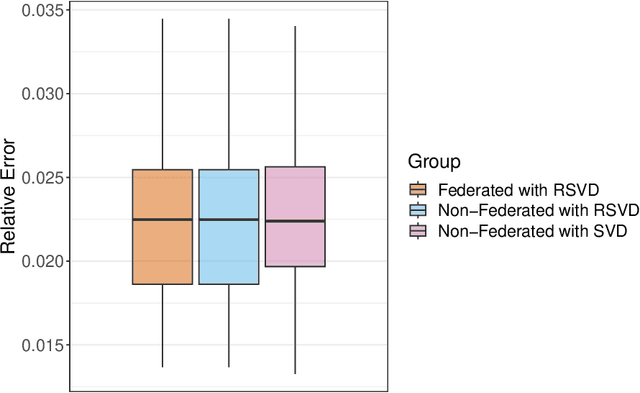
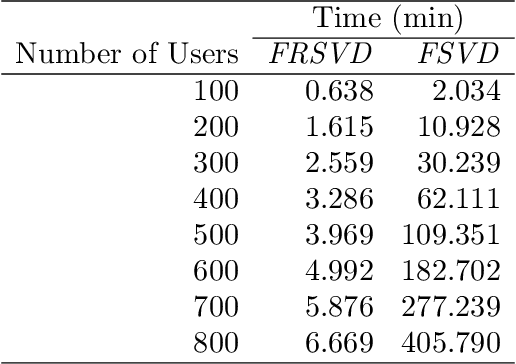
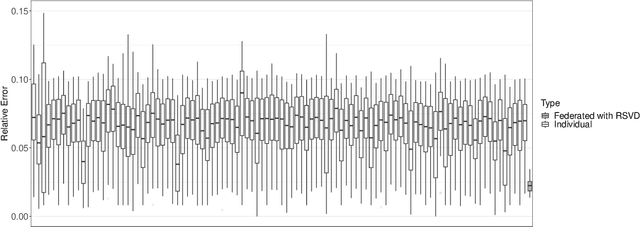
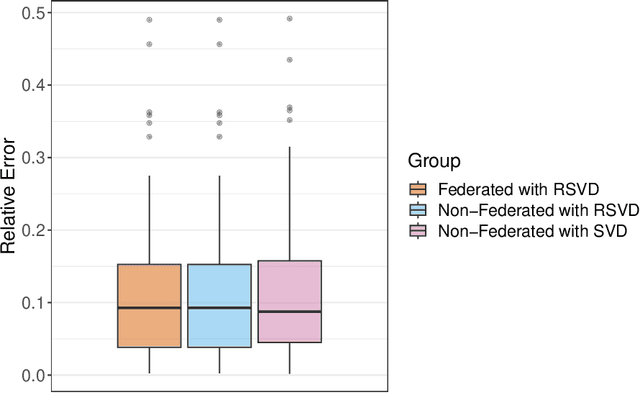
Abstract:Industrial prognostics aims to develop data-driven methods that leverage high-dimensional degradation signals from assets to predict their failure times. The success of these models largely depends on the availability of substantial historical data for training. However, in practice, individual organizations often lack sufficient data to independently train reliable prognostic models, and privacy concerns prevent data sharing between organizations for collaborative model training. To overcome these challenges, this article proposes a statistical learning-based federated model that enables multiple organizations to jointly train a prognostic model while keeping their data local and secure. The proposed approach involves two key stages: federated dimension reduction and federated (log)-location-scale regression. In the first stage, we develop a federated randomized singular value decomposition algorithm for multivariate functional principal component analysis, which efficiently reduces the dimensionality of degradation signals while maintaining data privacy. The second stage proposes a federated parameter estimation algorithm for (log)-location-scale regression, allowing organizations to collaboratively estimate failure time distributions without sharing raw data. The proposed approach addresses the limitations of existing federated prognostic methods by using statistical learning techniques that perform well with smaller datasets and provide comprehensive failure time distributions. The effectiveness and practicality of the proposed model are validated using simulated data and a dataset from the NASA repository.
Deep Learning-Based Residual Useful Lifetime Prediction for Assets with Uncertain Failure Modes
May 09, 2024Abstract:Industrial prognostics focuses on utilizing degradation signals to forecast and continually update the residual useful life of complex engineering systems. However, existing prognostic models for systems with multiple failure modes face several challenges in real-world applications, including overlapping degradation signals from multiple components, the presence of unlabeled historical data, and the similarity of signals across different failure modes. To tackle these issues, this research introduces two prognostic models that integrate the mixture (log)-location-scale distribution with deep learning. This integration facilitates the modeling of overlapping degradation signals, eliminates the need for explicit failure mode identification, and utilizes deep learning to capture complex nonlinear relationships between degradation signals and residual useful lifetimes. Numerical studies validate the superior performance of these proposed models compared to existing methods.
Differentially Private Log-Location-Scale Regression Using Functional Mechanism
Apr 12, 2024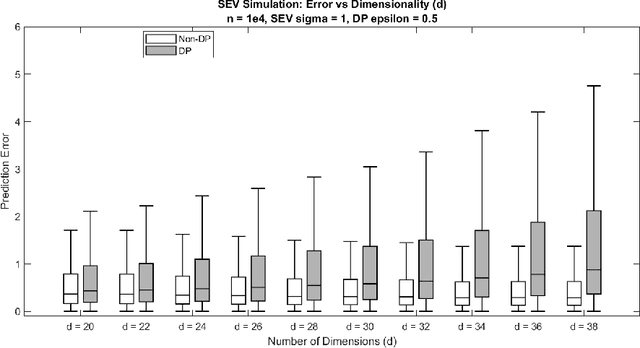
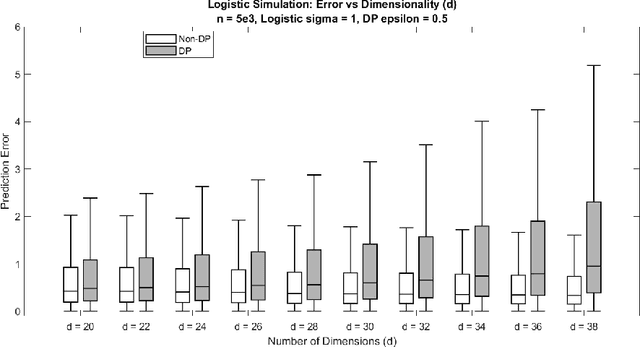
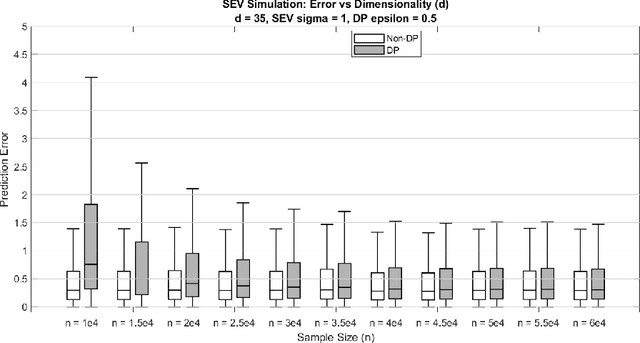
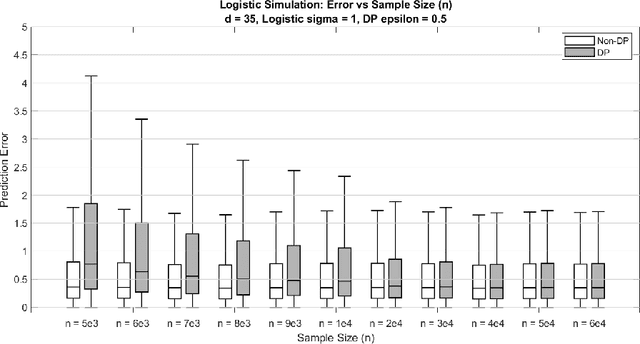
Abstract:This article introduces differentially private log-location-scale (DP-LLS) regression models, which incorporate differential privacy into LLS regression through the functional mechanism. The proposed models are established by injecting noise into the log-likelihood function of LLS regression for perturbed parameter estimation. We will derive the sensitivities utilized to determine the magnitude of the injected noise and prove that the proposed DP-LLS models satisfy $\epsilon$-differential privacy. In addition, we will conduct simulations and case studies to evaluate the performance of the proposed models. The findings suggest that predictor dimension, training sample size, and privacy budget are three key factors impacting the performance of the proposed DP-LLS regression models. Moreover, the results indicate that a sufficiently large training dataset is needed to simultaneously ensure decent performance of the proposed models and achieve a satisfactory level of privacy protection.
Federated Multilinear Principal Component Analysis with Applications in Prognostics
Dec 11, 2023



Abstract:Multilinear Principal Component Analysis (MPCA) is a widely utilized method for the dimension reduction of tensor data. However, the integration of MPCA into federated learning remains unexplored in existing research. To tackle this gap, this article proposes a Federated Multilinear Principal Component Analysis (FMPCA) method, which enables multiple users to collaboratively reduce the dimension of their tensor data while keeping each user's data local and confidential. The proposed FMPCA method is guaranteed to have the same performance as traditional MPCA. An application of the proposed FMPCA in industrial prognostics is also demonstrated. Simulated data and a real-world data set are used to validate the performance of the proposed method.
A Federated Data Fusion-Based Prognostic Model for Applications with Multi-Stream Incomplete Signals
Nov 13, 2023Abstract:Most prognostic methods require a decent amount of data for model training. In reality, however, the amount of historical data owned by a single organization might be small or not large enough to train a reliable prognostic model. To address this challenge, this article proposes a federated prognostic model that allows multiple users to jointly construct a failure time prediction model using their multi-stream, high-dimensional, and incomplete data while keeping each user's data local and confidential. The prognostic model first employs multivariate functional principal component analysis to fuse the multi-stream degradation signals. Then, the fused features coupled with the times-to-failure are utilized to build a (log)-location-scale regression model for failure prediction. To estimate parameters using distributed datasets and keep the data privacy of all participants, we propose a new federated algorithm for feature extraction. Numerical studies indicate that the performance of the proposed model is the same as that of classic non-federated prognostic models and is better than that of the models constructed by each user itself.
A Supervised Tensor Dimension Reduction-Based Prognostics Model for Applications with Incomplete Imaging Data
Jul 22, 2022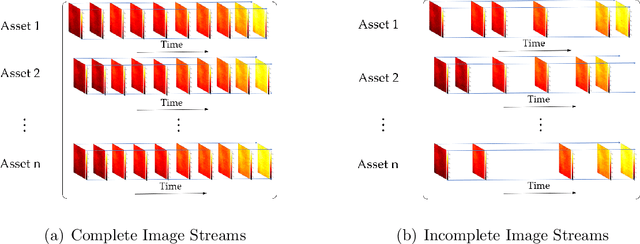

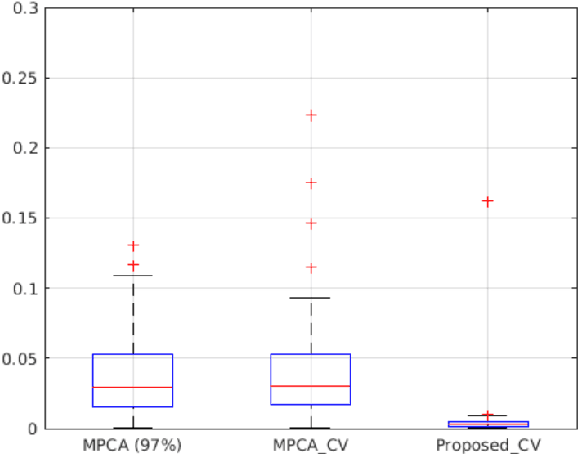
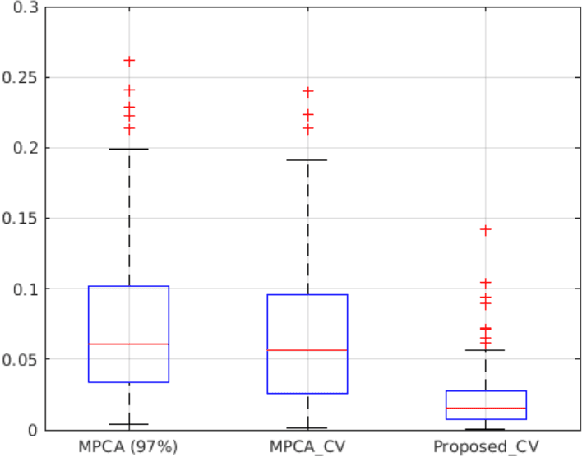
Abstract:This paper proposes a supervised dimension reduction methodology for tensor data which has two advantages over most image-based prognostic models. First, the model does not require tensor data to be complete which expands its application to incomplete data. Second, it utilizes time-to-failure (TTF) to supervise the extraction of low-dimensional features which makes the extracted features more effective for the subsequent prognostic. Besides, an optimization algorithm is proposed for parameter estimation and closed-form solutions are derived under certain distributions.
 Add to Chrome
Add to Chrome Add to Firefox
Add to Firefox Add to Edge
Add to Edge